Projects and collaborations
Within the Real-World Lab Accessibility, we work with citizens and partner organizations to develop digital solutions that can help self-determined participation of disabled people in society.
Within the Real-World Lab Accessibility, we work with citizens and partner organizations to develop digital solutions that can help self-determined participation of disabled people in society.
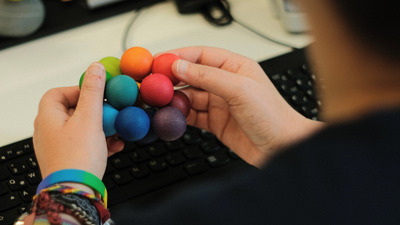
Neurodivergence and Technology in the Workplace
We study which different roles technology plays in the lives of workers who have ADHD, or are dyslexic or autistic. Compared to previous research, we aim to cover a wide range of work places and occupations, inlcuding unpaid care work. „Technology“ to us means everything from machines and tools to smartphones, computers and software, and also includes (physical) bulletin boards and note-taking technologies. Some technologies, we assume, may be helping in completing work-related tasks, while others might be hindering. For further information, please contact Sabrina Burtscher.
We study which different roles technology plays in the lives of workers who have ADHD, or are dyslexic or autistic. Compared to previous research, we aim to cover a wide range of work places and occupations, inlcuding unpaid care work. „Technology“ to us means everything from machines and tools to smartphones, computers and software, and also includes (physical) bulletin boards and note-taking technologies. Some technologies, we assume, may be helping in completing work-related tasks, while others might be hindering. For further information, please contact Sabrina Burtscher.
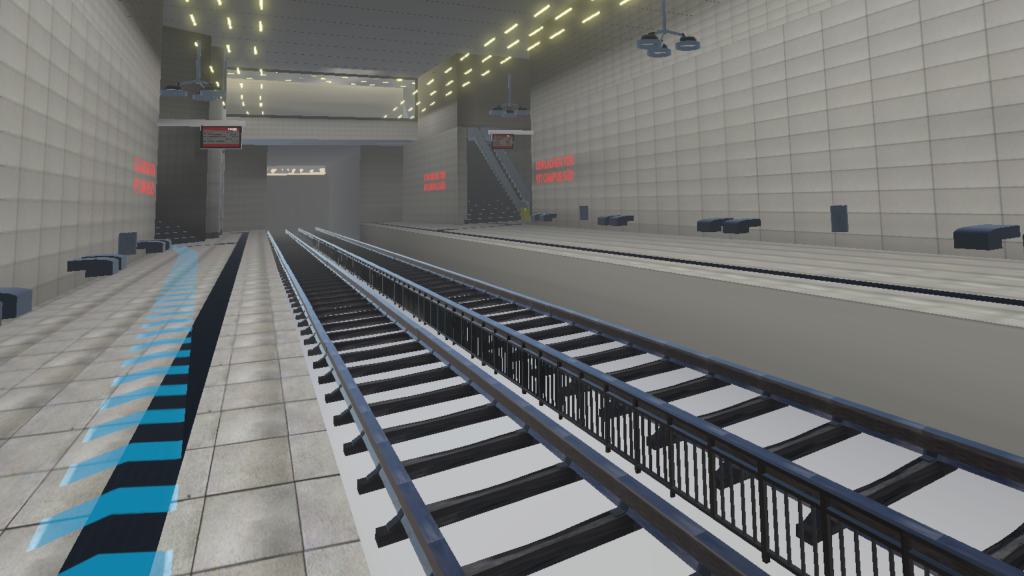
Virtual Reality (VR) as a Tool to Explore Accessibility
We develop VR environments to create a flexible space that allows us to study how different groups of people respond to changes in the built environment. In particular, we are interested in adaptations of the environment that increase accessibility. In this context, we developed a digital twin of one of Karlsruhe's most complex traffic hubs, "Durlacher Tor". For further information, please contact Dr. Dmitry Alexandrovsky.
We develop VR environments to create a flexible space that allows us to study how different groups of people respond to changes in the built environment. In particular, we are interested in adaptations of the environment that increase accessibility. In this context, we developed a digital twin of one of Karlsruhe's most complex traffic hubs, "Durlacher Tor". For further information, please contact Dr. Dmitry Alexandrovsky.
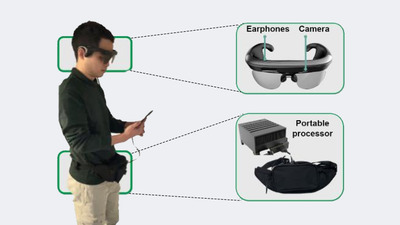
Accessible Mobility on Campus
The campus in Karlsruhe is very broad and for many students and visitors, especially at the beginning, difficult. We explore how systems can be developed that use AI-based computer vision methods to inform students with blindness about the environment and to support navigation. KIT contact for this project is Dr. Jiaming Zhang.
The campus in Karlsruhe is very broad and for many students and visitors, especially at the beginning, difficult. We explore how systems can be developed that use AI-based computer vision methods to inform students with blindness about the environment and to support navigation. KIT contact for this project is Dr. Jiaming Zhang.
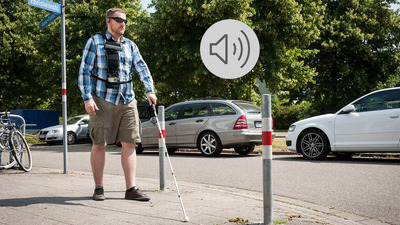
Acoustic Interfaces & Accessibility
Travelling to unknown places is a matter of course for many people. They use a wide range of visual information for orientation, which is not available to people with blindness. We explore what visual information is relevant to people with blindness and how it can be provided acoustically. KIT contact partner for this project is Dr. Angela Schön.
Travelling to unknown places is a matter of course for many people. They use a wide range of visual information for orientation, which is not available to people with blindness. We explore what visual information is relevant to people with blindness and how it can be provided acoustically. KIT contact partner for this project is Dr. Angela Schön.

Sport and Accessibility
Sport brings many benefits for people with and without disabilities and can be an important factor for social cohesion. However, for people with disabilities in particular, sport is often seen primarily as a means of therapy and digital technology is being developed for this purpose. In this project, we are exploring how these technologies can also improve the experiential nature of common sports. The aim is to enable this target group to enjoy the same benefits of sport as non-disabled people. The contact person for this project is Lukas Strobel.
Sport brings many benefits for people with and without disabilities and can be an important factor for social cohesion. However, for people with disabilities in particular, sport is often seen primarily as a means of therapy and digital technology is being developed for this purpose. In this project, we are exploring how these technologies can also improve the experiential nature of common sports. The aim is to enable this target group to enjoy the same benefits of sport as non-disabled people. The contact person for this project is Lukas Strobel.
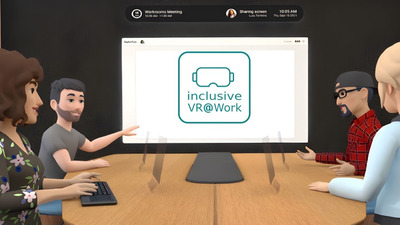
Cooperation in VR for people with and without low vision
Current workplaces are not accessible to people with visual impairment and are adapted to their vision using assistive technologies. However, the changed representation makes it difficult for people with and without visual impairment to cooperate. We explore how virtual reality work environments can be adapted so that people with and without visual impairment can work together without barriers. KIT contact partner for this project is Julia Anken.
Current workplaces are not accessible to people with visual impairment and are adapted to their vision using assistive technologies. However, the changed representation makes it difficult for people with and without visual impairment to cooperate. We explore how virtual reality work environments can be adapted so that people with and without visual impairment can work together without barriers. KIT contact partner for this project is Julia Anken.

Digital documents & Accessibility
Many documents are available digitally, but are often not accessible. We explore how AI can be used to make visual information, such as images, diagrams and tables, accessible. KIT contact partners for this project are Dr. Thorsten Schwarz and Dr. Jiaming Zhang.
Many documents are available digitally, but are often not accessible. We explore how AI can be used to make visual information, such as images, diagrams and tables, accessible. KIT contact partners for this project are Dr. Thorsten Schwarz and Dr. Jiaming Zhang.

Inclusive Museum Experiences
We are working with our cooperation partners from the State Museum of Natural History Karlsruhe (SMNK) to explore how museum exhibitions could be designed to provide enriching, inclusive experiences for all visitors. The SMNK is one of the largest natural history museums in Germany. The KIT contact person for this project is Dr. Zeynep Şölen Yıldız.
We are working with our cooperation partners from the State Museum of Natural History Karlsruhe (SMNK) to explore how museum exhibitions could be designed to provide enriching, inclusive experiences for all visitors. The SMNK is one of the largest natural history museums in Germany. The KIT contact person for this project is Dr. Zeynep Şölen Yıldız.
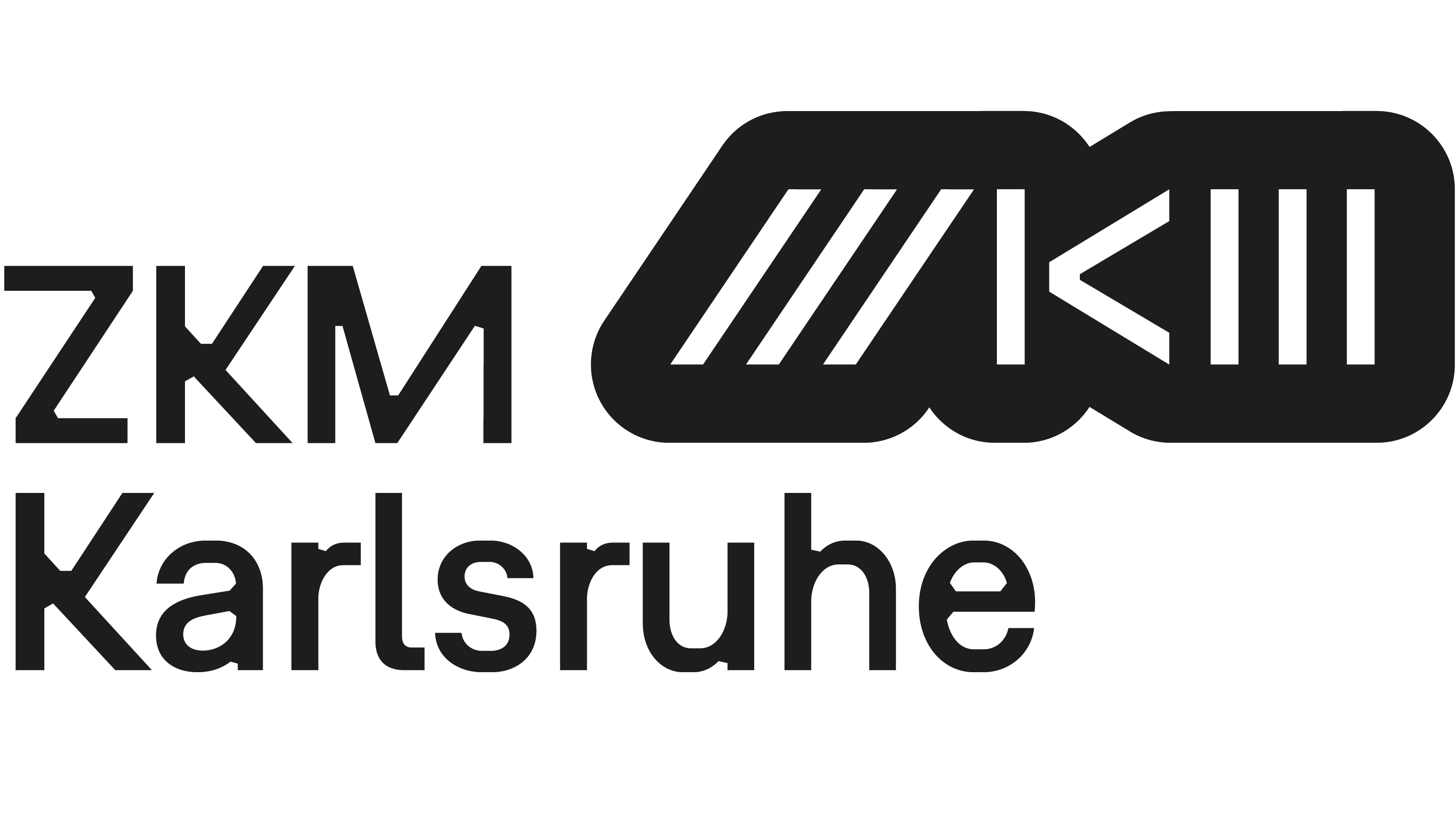
Accessible Gaming
Digital games are played by people of all backgrounds. Together with the ZKM | Center for Art and Media Karlsruhe, we are researching how digital games are experienced by people with disabilities. The ZKM is an exhibition space for media of all types and has been showing digital games since 1997. The current permanent exhibition on the subject is the “zkm_gameplay”. The KIT contact person for this project is Anna-Lena Meiners.
Digital games are played by people of all backgrounds. Together with the ZKM | Center for Art and Media Karlsruhe, we are researching how digital games are experienced by people with disabilities. The ZKM is an exhibition space for media of all types and has been showing digital games since 1997. The current permanent exhibition on the subject is the “zkm_gameplay”. The KIT contact person for this project is Anna-Lena Meiners.

Cooperation with she.codes
We support the student initiative she.codes with their educational programs and organizational matters. she.codes is a group of students from KIT and TU Munich. It offers low-threshold programming workshops, especially for girls, with the aim of getting them interested in computer science and technical topics.
We support the student initiative she.codes with their educational programs and organizational matters. she.codes is a group of students from KIT and TU Munich. It offers low-threshold programming workshops, especially for girls, with the aim of getting them interested in computer science and technical topics.

